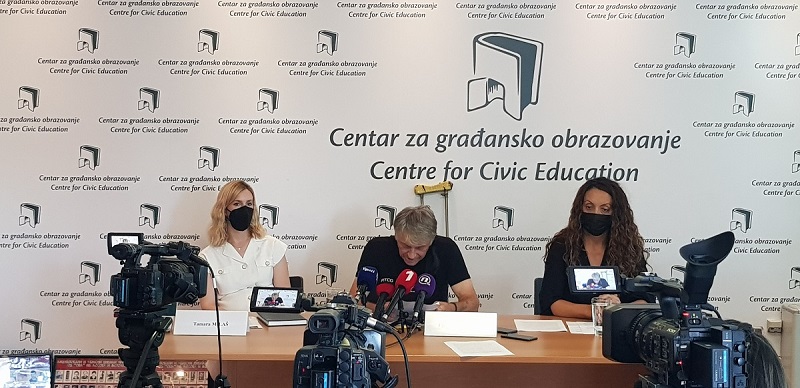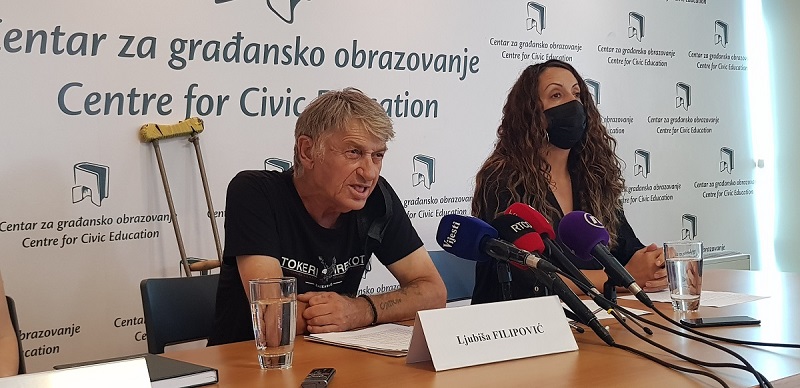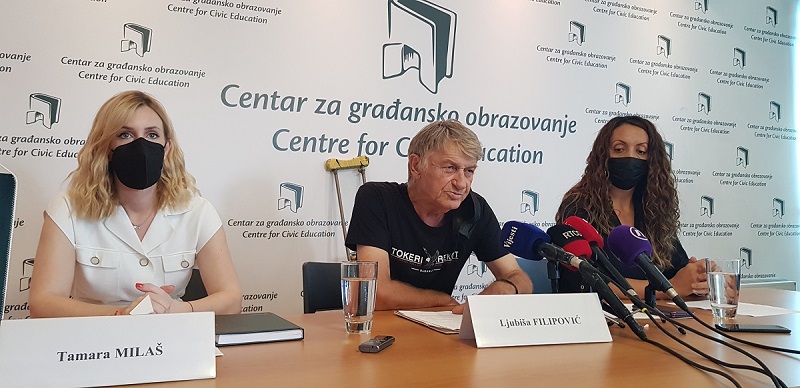The right of families is to know the fate of their loved ones who are considered missing, and enlightening the destiny of the missing persons represent an obligation to victims, their families and society as a whole, as it was stated today, at the press conference of the Association of Families of Missing, Kidnapped and Murdered Persons “Crveni božur” and Centre for Civic Education (CCE), which they organized on the occasion of the International Day of Disappeared.
Tamara Milaš, Human Rights Programme Coordinator at the CCE, claimed that “the governments of post-Yugoslav countries must initiate joint action aimed at resolving fates of 11048 persons related with wars in Croatia, Bosnia and Herzegovina, Kosovo and Montenegro, but also that governmental commission need to stop acting as spokespersons for the interests of the ruling parties, to treat all victims with equal respect and to shed light on the fate of the missing persons in both the interests of families and the public.”
The fate of 1968 persons from Croatia, 7371 from Bosnia and Herzegovina, and 1630 persons from Kosovo is still unknown.
“We reiterate our appeal to the competent institutions in Montenegro to work more proactively on clarifying the fate of 51 people, who are considered missing from Montenegro, as well as 28 citizens of Republic of Kosovo, whose families live in Montenegro,” said Milaš.
Milaš noted that neither Montenegrin normative framework in this area is not in line with international standards. “In Montenegro, enforced disappearance is not defined in the Criminal Code of Montenegro as a separate criminal offence, and Montenegro still has not legally determined the status of families of missing persons. It is necessary to include the overall programme of reparations of families of missing persons, which would mean, restitution, rehabilitation, satisfaction and guarantees of non-repetition of crime”, she noted.
Ljubiša Filipović, president of the Association of families of the missing, kidnapped and murdered persons “Crveni božur”, emphasized that “problem of missing persons is not political, but it is a problem of humans and humanity. Families of victims only demand rights guaranteed by conventions – the right to know the fate of their loved ones.”
Filipovic also emphasizes the existential problems which families of missing persons are facing with. “Families of the victims have chosen their destiny, and our destiny is Montenegro. It is high time that Montenegro finds a way to help these families to get homes. We call on all the state institutions to finally start resolving this issue, because otherwise – families will be forced to stand in front of the Parliament with photos of their loved ones until they get the response of the competent authorities.”
He reminds that institutions remained silent to numerous letters requesting a meeting with their delegation. “Many crimes are committed from all sides. We, the families of victims, condemn and lament for all the innocent victims, but we also demand from the others, especially from governments in the region, to find joint language and finally make a deal on taking the steps to find the missing ones”, stated Filipović.
“Until the truth about the missing persons is revealed, there will be no reconciliation among the nations. There is too much pain and grief in every family searching for its missing members…,” concluded Filipović.
Darka Džabasan, Secretary of the Commission on missing persons considers that “dynamics of solving the fate of missing persons in region is not satisfying, and of special concern is the fact that 4,000 unidentified bodies are still in mortuaries all over the region, whose identity cannot be precisely determined.”
She explained that the Commission, in cooperation with other commissions and other associations of countries in the region dealing with this issue, in the past period, solved and performed handover of remains of 33 persons who were citizens of Montenegro at the moment of their disappearance, or those who were looking for them, at the time when they reported their disappearance, had a residence in Montenegro.
“Persistence in resolving the fate of the missing, regardless of the time of disappearance, religious or national affiliation or any other diversity, requires intensification and coordination of activity of all competent bodies and institutions, as well as individuals who have data and information on the circumstances of the disappearance,” emphasized Džabasan.
“Missing persons represent a strong symbol of failure to protect individual rights and the rule of law. They are a constant reminder of human vulnerability and arbitrariness. The issue of missing persons contributes to the maintenance of an atmosphere of distrust... Therefore, it is important to seek clarification of each case of a missing person, but it is also important to try to solve this problem at the level of a society”, she emphasized.
The International Day of the Disappeared was established in 1981. It recalls the right of families to know the fate of their loved ones who are categorized as missing persons. It relates to those people who have disappeared in war conflicts, natural disasters, migrations, persons to whom the contact with family was disabled, and it calls on a higher degree of professionalism and establishment of standards to respect the unity of a family, to identify missing persons and to provide information about their fate.
Vasilije Radulović, Programme Associate



